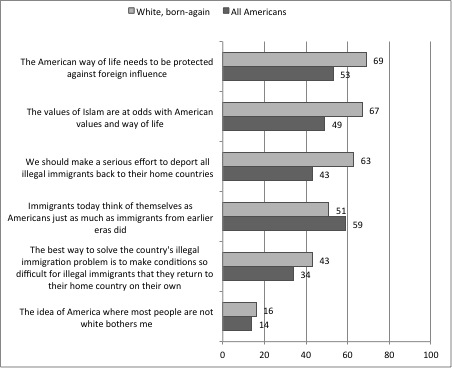The path to comprehensive immigration reform appears to have been smoothed by the 2012 presidential election. It was widely perceived that the Republican Party’s tough stand on immigration, supporting a policy of “self-deportation,” limited their appeal and cost votes in key states. At the same time, a crucial component of the Republican coalition, evangelical Protestants, have been making efforts to push immigration reform efforts as well for several years now. For instance, The Evangelical Immigration Table, a coalition of 150+ evangelical leaders, issued a post-election letter to President Obama calling for comprehensive immigration reform within the first 92 days of his second term (“92” is significant as the number of times the Hebrew word for immigrant “ger” appears in the Bible). This would appear to portend great change in the American political landscape.
One of the crucial lingering questions, then, is what evangelicals in the pews think of immigrants and immigration reform and what shapes their attitudes? It is no surprise that white, born-again respondents to a recent survey by PRRI have a distinctive outlook on immigrants and immigration, which the attached Figure 1 shows. In essence, evangelicals are more concerned about threats to an “American way of life” and are more in favor of deportation or self-deportation as policy options (thought not in huge majorities).
 White evangelicals are also more likely than other Americans believe that the growing number of newcomers from other countries threatens American values and way of life (58% vs. 40%). Finally, a survey experiment designed uncover concerns about the changing racial and ethnic makeup of America also found that white, born-again Christians were more likely than whites overall to be worried or bothered by the U.S. becoming a majority-minority nation. Half (50%) of white, born-again Christians agreed with the statement: “The idea of America where most people are not white bothers me.” In contrast, among whites overall, fewer than one-third (31%) agreed with this statement and among all Americans it fewer than 1-in-4 (23%) agreed.
White evangelicals are also more likely than other Americans believe that the growing number of newcomers from other countries threatens American values and way of life (58% vs. 40%). Finally, a survey experiment designed uncover concerns about the changing racial and ethnic makeup of America also found that white, born-again Christians were more likely than whites overall to be worried or bothered by the U.S. becoming a majority-minority nation. Half (50%) of white, born-again Christians agreed with the statement: “The idea of America where most people are not white bothers me.” In contrast, among whites overall, fewer than one-third (31%) agreed with this statement and among all Americans it fewer than 1-in-4 (23%) agreed.
White evangelicals are less likely to report having friends who were born outside the US, but this factor plays little role in shaping evangelicals views toward immigrants or immigration (in logistic regression models of the variables listed in the figure). This evidence helps us to focus our attention on evangelicals’ values and worldview, which by this logic should be the most significant determinants of their immigration attitudes. It turns out that is true, but the problem is that the two dominant values at play in this debate are cross-cutting. Those who believe enforcing the rule of law is more important are more likely to think that, for instance, the American way of life needs to be protected from foreign influence. On the other hand, those who believe that welcoming the stranger is more important believe the opposite – that the American way of life is not under threat. As of this polling snapshot, more evangelicals believe that enforcing the rule of law is extremely important (41%) than believe that welcoming the stranger is extremely important (25%). And few evangelicals (14%) believe that welcoming the stranger is more important than enforcing the rule of law. So, here’s the rub: this set of values probably leaves evangelicals resistant to opposing the current law and, thus opposed to immigration reform. Perhaps the only way to garner broad evangelical support is to change the law first, which would allow compassion for the undocumented to mesh with the law of the land.
Given the cross-cutting effect of the two primary values in play, it is no surprise that those who have heard their clergyperson speak out about immigration do not have systematically different views toward immigrants and immigration. If those clergy are following the scripts set out by the Evangelical Immigration Table, which emphasize the rule of law and welcoming the stranger, then we shouldn’t expect evangelicals in the pews to change their minds anytime soon.
Moreover, befitting their voting behavior, more evangelicals remain attached to the Republican Party. Evangelicals trust the Republican Party to deal with immigration and illegal immigration by a 2-1 margin (52-30% and 52-29%, respectively). Thus, the value conflict evangelicals hold is compounded by adherence to political figures and political beliefs who are only grudgingly supportive of immigration reform. Evangelical elites have taken a position in favor of comprehensive immigration reform for several years now and that shift may have given Republicans some cover. But, if there is going to be comprehensive immigration reform, we might give more credit to high ranking Republicans who read the tea leaves after November, 2012 and have since staked out positions in favor of a path to citizenship.




